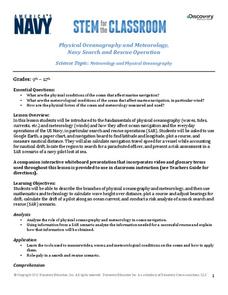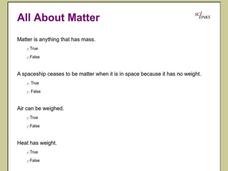Messenger Education
Give Me a Boost—How Gravity Assists Aid Space Exploration
The propellant needed for space explorations runs in the thousands, while paying to get the craft into orbit costs millions! In the second installment of three, two activities explore laws of conservation of energy and momentum. Using...
Forest Foundation
Forest Watersheds
Where does the water we use come from? To understand the concept of a watershed, class members study the water cycle and then engage in an activity that simulates a watershed.
It's About Time
Succession in Communities
What occurs following a natural disaster? High schoolers research this question and others as they investigate natural succession after a disaster. First, as they differentiate between primary and secondary succession, they explain...
It's About Time
Volcanos and the Atmosphere
In the summer of 1815, snow fell every month in New England. Was this related to the volcanic eruption of Tambora in Indonesia earlier in the year? Young scientists design their own experiments to research the long-term effect a volcanic...
Discovery Education
Physical Oceanography and Meteorology, Navy Search and Rescue Operation
It's an ocean rescue mission! Groups must find a pilot downed off the coast of the Chesapeake Bay. Rescuers must determine the distance needed to travel as well as the heading to get to the pilot's last known position. Taking...
Teach Engineering
Earthquakes Living Lab: The Theory of Plate Tectonics
Find out if your class agrees with Ice Age: Continental Drift ... or if it's just a fun family movie! Class members research the theory of continental drift, examine evidence of plate tectonics, connect...
University of Texas
Matter and the Periodic Table Chemical Families and Periodic Trends
Is assembling the periodic table as simple as Tetris? Scholars arrange colored cards into a logical order and then make connections to the arrangement of the periodic table. Hands-on activities include adding trend arrows and analyzing...
LABScI
Kinematics: The Gravity Lab
Falling objects can be brutal if you don't protect your noodle! Scholars explore the motion of falling objects through measuring short intervals to determine if the distance traveled varies with time. Building off of this, scholars...
Curated OER
What is Deforestation?
An overview of deforestation is the focus of this resource, which present the reader with a list of facts. Ten comprehension questions follow; learners can write their answers on a separate piece of paper. Have your environmental...
Curated OER
Scavenger Hunt: Home Sweet Habitat
In this animal habitat worksheet, learners participate in a scavenger hunt that involves an in-depth study of animal habitats and then correlates that concept to the student's own personal habitat's.
Royal BC Museum
Kids Page - Whales
Read about the physical features of whales and how they are grouped according to their method of eating food. A neat activity is described on the page; consider carrying this out in class. The resource makes a nice addition to a lesson...
Curated OER
Chapter 12 Worksheet - Ions, Ionic Bonding, anc Covalent Bonding
Four pages provide plenty of problem solving practice for chemistry whizzes. They answer questions and write electron configurations for ions. They use Lewis dot diagrams to display equations. Covalent bonds are explored. The last half...
Curated OER
USGS Seismometer
A large black-line diagram of a seismometer fills this page. It is not a worksheet, but rather an explanation of how a seismometer works. You could make a transparency of it or display it via a video screen when teaching about...
Curated OER
All About Matter
Twenty-four questions about matter, the states of matter and the properties of matter make up this interactive online instructional activity. Your class will determine the volume of water, the shape of water and the shapes of matter.
Deliberating in a Democracy
Global Climate Change
Students examine an environmental issue. In this global studies lesson plan, students read an article entitled, "Global Climate Change," and respond to the discussion questions that accompany it.
Curated OER
Recycling Quiz
Ten multiple questions about recycling comprise this quiz. Administer this as a pre-test prior to presenting a lesson on recycling glass, plastic, and metals. Since an answer key is provided along with comments, you can use it as a guide...
Curated OER
Campbell's Biology
Six chapters of a biology characteteristics of different domains xt are covered in this twenty-page assignment. Biology buffs chart the characteristics of different groups of organisms and address many critical-thinking questions...
Curated OER
Unit VIII: Worksheet 4 - Central Force
Send physics learners into orbit by assigning this seven-problem worksheet. They will calculate the mass of a satellite, construct a force diagram, determine the radius of the orbit, and more. Physics worksheets can become wearisome, but...
It's About Time
Volcanic History of Your Community
Did you know there are 20 volcanoes erupting at any given time? Pupils look at various igneous rocks, read local geologic maps, and determine if their area has a history of volcanic activity. A reading passage and analysis questions...
CPO Science
Potential and Kinetic Energy
Here's a resource ideal for independent learners who need extra reinforcement or would like to work ahead. These textbook chapters and practice problems cover many basic physics concepts, starting with potential and kinetic energy and...
Messenger Education
Exploring Solar Systems Across the Universe
Scientists have theorized that our solar system formed 4.6 billion years ago. In this pair of activities, learners first hypothesize how our solar system was formed. Using this information, groups then determine how scientists search for...
Curated OER
Single Event Upsets in Aircraft Avionics
In this aircraft avionics activity, science fans read about the first unmanned air vehicle that collects data about the Earth and is subject to damage by cosmic ray showers. Pupils analyze two graphs of data showing the neutron flux vs....
Creative Chemistry
Fossil Fuels Summary
As the title suggests, this is a simple summary of fossil fuels. There are no questions or problems to solve or no notes about fossil fuels. The notes cover how fossil fuels are formed, how we extract them, what humans use them for, and...
Wilderness Classroom
Pollution
Educate scholars on pollution—air, water, and land—with a series of lessons that begin with a thorough explanation of each type. Learners then take part in three activities to reinforce the importance of reducing pollution. They...























